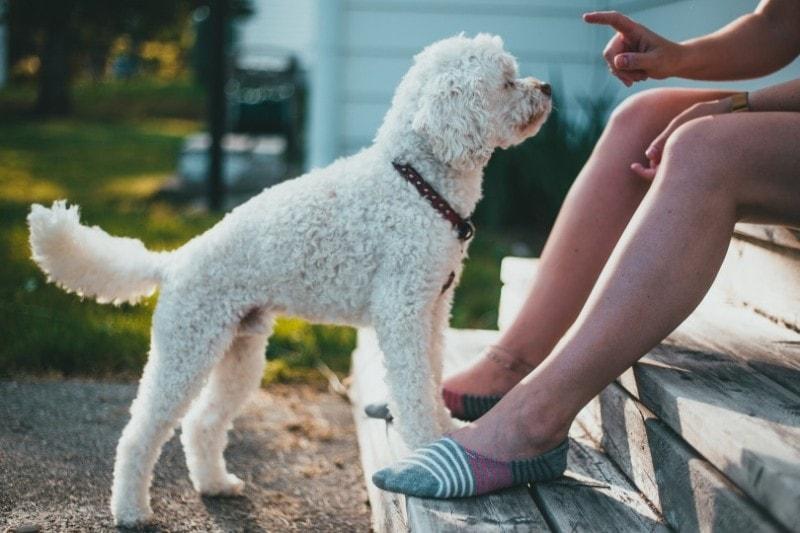Poodle Training: Unlocking the Mind of a Canine Genius
When it comes to companion animals, few breeds rival the intelligence, elegance, and charm of the poodle. With their distinctive curly coats and an innate sense of curiosity, poodles captivate hearts—and challenge minds. Whether you’re a proud owner of a Standard, Miniature, or Toy poodle, understanding the nuances of their nature is key to successful training. This article dives into the art and science of poodle training, offering insights into the breed’s learning styles, common challenges, and effective techniques. By harnessing their intelligence and eagerness to please, you can transform your poodle not just into a well-behaved pet, but a true partner in adventure and companionship. Join us as we explore the world of poodle training, where every command learned is a step towards a deeper bond with your remarkable canine friend.
Table of Contents
- Understanding the Unique Traits of Poodles for Effective Training
- Building a Strong Bond: Positive Reinforcement Techniques for Poodles
- Essential Commands and Skills Every Poodle Should Master
- Overcoming Common Training Challenges with Poodles
- Q&A
- Final Thoughts
Understanding the Unique Traits of Poodles for Effective Training
Poodles are not just known for their elegance and intelligence; they also possess unique traits that can greatly enhance the training process. Their high intelligence makes them quick learners, which allows them to grasp commands and tricks with just a few repetitions. This adaptability is complemented by their curiosity, ensuring that they remain engaged throughout training sessions. To leverage these traits effectively, trainers should utilize a variety of training methods, catering to the poodle’s need for mental stimulation. Strategies such as positive reinforcement or clicker training can yield significant results, thanks to the poodle’s eagerness to please.
Another distinctive characteristic of poodles is their sensitivity to tone, which means that the way instructions are delivered can impact their performance. Maintaining a supportive and encouraging demeanor can foster a positive training environment. Additionally, the social nature of poodles means that they thrive in interactive settings, making group classes or socialization with other dogs beneficial. To better understand how to train these intelligent dogs, consider the following table highlighting essential traits and effective training techniques:
| Trait | Effective Training Technique |
|---|---|
| High Intelligence | Clicker Training |
| Curiosity | Interactive Games |
| Sensitivity to Tone | Positive Reinforcement |
| Social Nature | Group Classes |
Building a Strong Bond: Positive Reinforcement Techniques for Poodles
To cultivate a healthy and joyful relationship with your Poodle, employing positive reinforcement is essential. This technique focuses on rewarding desired behaviors rather than punishing unwanted ones, creating a nurturing environment for your dog to thrive. When training your Poodle, consider integrating the following methods:
- Verbal Praise: Use a cheerful tone and words of affirmation when your Poodle excels in a task.
- Treat Rewards: Offer tasty, small treats immediately after your Poodle performs a desired action to reinforce behavior.
- Affection: Physical touch, such as petting or cuddling, can be incredibly motivating for Poodles who crave connection.
- Playtime: Incorporate fun activities like fetch or tug-of-war as rewards, ensuring your Poodle associates learning with joy.
Creating a consistent training routine is also vital. Allocate specific times during the day for training sessions, which may help your Poodle understand when to expect these positive interactions. Keep sessions short and engaging, and gradually increase the difficulty of tasks as your furry friend progresses. You can use the following table to track your Poodle’s progress:
| Training Session | Date | Task | Reward Given |
|---|---|---|---|
| Session 1 | 2023-10-01 | Sit | Treat + Praise |
| Session 2 | 2023-10-03 | Stay | Treat + Playtime |
| Session 3 | 2023-10-05 | Come | Treat + Cuddles |
Essential Commands and Skills Every Poodle Should Master
Every poodle, regardless of its size, can benefit greatly from mastering a core set of commands. These essential skills not only enhance obedience but also fortify the bond between owner and pet. Begin with the basics, emphasizing sit, stay, and come. These foundational commands serve as a gateway to more advanced training and improve everyday interactions. Additionally, incorporating heel and leave it can foster good leash manners and safety during walks.
As training progresses, introducing more specialized skills will keep your poodle mentally stimulated and engaged. Consider teaching them to respond to wait, which is invaluable for managing doorways, and drop it, which is crucial for preventing them from swallowing harmful objects. To ensure a well-rounded set of skills, focus on socialization through commands such as watch me, which can redirect your poodle’s attention amidst distractions. The following table summarizes advanced commands that can elevate training sessions:
| Command | Purpose |
|---|---|
| Wait | Helps your poodle pause before moving forward, enhancing safety. |
| Drop It | Crucial for preventing dangerous chewing or swallowing. |
| Watch Me | Redirects focus to you in distracting environments. |
Overcoming Common Training Challenges with Poodles
Poodles are intelligent and highly trainable, but they do come with their own set of challenges that can complicate the training process. To effectively address these challenges, it’s essential to understand their temperament and behavior. One common issue is their tendency to become bored easily, which can lead to a lack of focus during training sessions. To keep their interest piqued, consider incorporating a variety of activities. Here are some suggestions to enhance their training experience:
- Short training sessions: Aim for 5 to 10 minutes to maintain their attention.
- Positive reinforcement: Use treats and praise to encourage desired behaviors.
- Interactive games: Incorporate puzzles and agility training to stimulate their minds.
Another common challenge is their sensitivity to corrections. Poodles respond best to a gentle approach, and harsh training methods can lead to anxiety and mistrust. Instead, focusing on building a strong bond of mutual respect can lead to remarkable results. Establishing a fair training environment will ensure that they feel secure and motivated. A balanced training strategy might include:
| Training Method | Benefits |
|---|---|
| Clicker Training | Clear communication and encourages quick learning. |
| Positive Reinforcement | Builds confidence and strengthens the bond. |
| Socialization Activities | Promotes adaptability and reduces fear in new situations. |
Q&A
Q&A: Mastering the Art of Poodle Training
Q1: What makes poodles unique when it comes to training?
A1: Poodles are renowned for their intelligence. They are consistently ranked among the smartest dog breeds. This intellectual agility allows them to quickly learn commands and tricks, making them ideal candidates for training. Their eagerness to please and strong bond with their owners further enhances their responsiveness during training sessions.
Q2: What are some basic commands every poodle should learn?
A2: Just like a magician’s essential tricks, there are a few basic commands crucial for every poodle’s repertoire. Start with “sit,” “stay,” “come,” and ”down.” These commands not only lay the foundation for advanced tricks but also ensure safety in various situations. It’s advisable to begin training these commands as early as possible, ideally during puppyhood.
Q3: How can I keep poodle training fun and engaging?
A3: Poodles thrive on variety and mental stimulation. Incorporate interactive games, use toys, or even train in different locations to keep their interest piqued. Positive reinforcement—like treats or praise—acts as a delightful reward for their accomplishments. Remember, when the training feels like fun, both you and your poodle will enjoy the experience!
Q4: Are there specific training techniques that work best for poodles?
A4: Positive reinforcement is the golden rule for poodle training. Techniques such as clicker training encourage desired behaviors without the use of harsh corrections. Incorporating short, consistent sessions—about 5-10 minutes—can also yield better results due to their short attention spans. Building patience and allowing frequent breaks can keep the learning environment positive.
Q5: How do I address challenges during training?
A5: Every pet owner hits a few bumps in the road. If your poodle seems distracted or unmotivated, check the training environment for potential distractions. It might also help to reassess the duration or complexity of your training sessions. Remember, dogs can have off days just like humans! Persistence, patience, and keeping a calm demeanor are essential in overcoming any training challenges.
Q6: What role does socialization play in poodle training?
A6: Socialization is a critical facet of your poodle’s training journey. Exposing them to various environments, people, and other animals helps build confidence and reduces anxiety in new situations. Aim for early and ongoing socialization experiences, which can significantly enhance their adaptability and behavior as they grow.
Q7: Can older poodles still be trained effectively?
A7: Absolutely! While younger poodles may adapt more quickly, older poodles can also learn new skills and tricks—perhaps at a different pace. Tailoring your training approach to their personality and physical capabilities is key. Patience is essential, and never underestimate the power of a few well-timed belly rubs as motivation!
Q8: How do I track my poodle’s training progress?
A8: Keeping a training journal can be remarkably beneficial. Documenting each session enables you to note your dog’s improvements and identify areas needing extra focus. You can also maintain a checklist of commands they’ve mastered, which can be rewarding to review as your poodle becomes a well-trained companion.
Q9: Are there any resources you recommend for poodle training?
A9: Plenty of resources are available to aid in your poodle’s training journey! Look for reputable dog training books, online courses, or local training classes. Joining poodle-specific forums or groups can also connect you with fellow owners who share tips and experiences. Don’t forget to consult your veterinarian for advice on training and behavior concerns!
Q10: What are the long-term benefits of investing time in poodle training?
A10: Investing time in training your poodle results in a well-mannered, social, and happy dog. A trained poodle is typically more secure, reducing the likelihood of anxiety-driven behaviors. Plus, the bond you build through training fosters trust and enhances your relationship. In essence, proper training lays the groundwork for a lifelong friendship filled with joy and companionship!
With the right approach, patience, and creativity, training your poodle can be a fulfilling experience that opens up a world of possibilities—both for you and your furry friend!
Final Thoughts
As we conclude our exploration of poodle training, it’s clear that fostering a bond with your furry friend goes hand in hand with effective training methods. Each poodle, with its unique personality and quirks, presents an opportunity for growth and understanding, not just for the dog, but for the owner as well. Remember that patience, consistency, and a sprinkle of creativity can transform the training experience into a joyful journey. From mastering basic commands to dazzling tricks, the world of poodle training is as expansive and rewarding as the intelligence of these remarkable dogs. Embrace the training process, celebrate the small victories, and watch as your poodle evolves into a well-mannered companion. May your days be filled with wagging tails and newfound skills, and may the bond you share continue to deepen with every lesson learned. Happy training!



